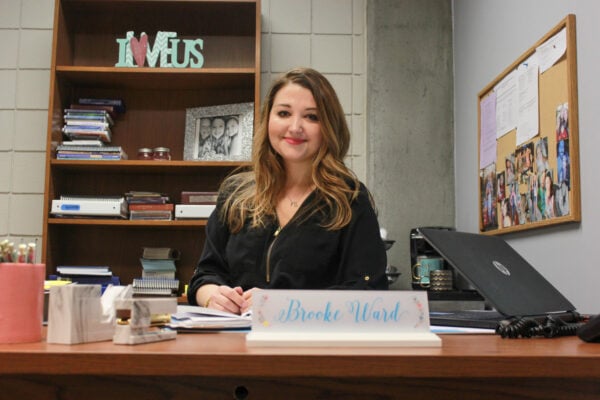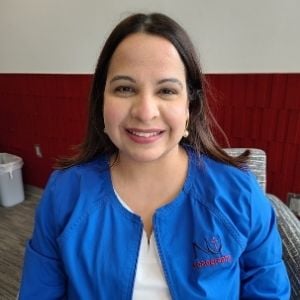When Marjorie Subero moved with her family to Wichita five years ago for her husband’s job, she sought her own career change. She has a background in medicine and was previously a physician but it was time for something new.
“I need my kids to be proud of me,” Subero said. “I need my kids to know that mama didn’t give up. Mom was going to reinvent herself. So, I’m here.”
And where is “here” exactly? Newman University.
As a student in the sonography program, Subero, who’s originally from the Dominican Republic, feels at home in her new path.
“Ultrasound is the best of both worlds, honestly, because you have a career that’s a very versatile part of diagnostic medicine,” she said. “At the same time, you combine a skillset with hands-on patient care. And to me, that is the best.”
Studying at Newman has proven to be a great fit for Subero as she pursues her bachelor’s degree in diagnostic medical sonography.
“I come from a different country, from a different culture,” she said, “so going to a U.S. school is a big thing. I’ve seen all the different schools in Wichita, and Newman has been the best and my first choice. And honestly, I am so happy with that choice because Newman has personalized treatment. You have someone to talk to, they actually care about you and they want you to succeed.”
As she continues to reinvent herself and work toward her degree, Subero has high hopes for the future.
“It’s a process,” she said. “It has its ups and downs, but so far I’m happy with my choice.”

The Newman University sonography program
According to Brooke Ward, director of Newman’s diagnostic medical sonography program, the program has seen a lot of growth over the years. Most sonography programs offer either certificates or associate degrees, but Newman students are at an advantage because they can receive a bachelor’s degree.
“Being able to step up into the bachelor’s degree has been really nice,” Ward said. “We’ve been able to change out the curriculum to where the students have more time in class and working with the machines on-campus prior to going out to clinical sites, so they’re going out with more knowledge, more confidence. It helps quite a bit once they get out into the clinical site so they can build on that skillset while they’re out.”

Ward herself received a bachelor’s degree from Newman and worked in the sonography field for more than a decade before being asked to return to the university to teach. She quickly realized teaching was a great fit for her, so she decided to pursue a master’s degree in health care education and is currently completing her studies in addition to her teaching duties.
Before students can apply for the sonography program, they must complete prerequisite courses. These classes help lay the foundation for what students will learn in the sonography program.
To be successful, Ward said it’s helpful for students to have good base knowledge of anatomy, physiology and physics. Once they’re in the program, they take courses in three areas of sonography; abdominal, vascular and OB/GYN. This means that once a student graduates, they are prepared to take any of the American Registry of Diagnostic Medical Sonographers examinations, including Sonography Principles and Instrumentation, Abdomen, OB/GYN or Vascular.
Students spend their first two semesters in the program learning basic protocols and then spend their final two semesters at clinical sites for hands-on training.

The career outlook for people with a degree in sonography is one of promise. Graduates can work in a variety of fields and specialties.
While the first thing that comes to mind when folks hear the word “sonography” may be pregnant women, there’s much more to it. Sonography is expanding into other parts of the body, like the heart and blood vessels, as many doctors now use it as part of their medical treatment because it’s non-invasive.
Ward said one of the draws for students to the Newman sonography program is that it’s fairly small, enabling them to form a family-like bond with each other. Another perk is that students have versatility in which line of sonography they want to go into.
“It’s really nice when I get feedback from the students that they feel they were set up for success, so they feel more confident,” Ward said. “They feel like they can go out and take those boards and pass them because we’ve prepared them fully in that way.”
After graduation, many students start out working in a hospital setting. Some graduates transition into selling sonography machines or doing travel sonography, and some have moved to places like Australia and Hawaii.
“It’s really cool to see them be able to branch out and go do other things with (sonography),” Ward said. “I think that the coolest part is maybe the sales of the machines. That really pulls in the physics part. So when students really excel and decide they enjoy that technical factor and they can go that way with it, it’s neat.”
Wherever Newman graduates land, Ward is proud of the work they’re doing.
“They’re just making a difference by adding to our community of sonographers and being able to keep that a positive environment and giving their knowledge back,” she said.

On the flip side, students like Subero give a lot of credit to the sonography program’s instructors for guiding them toward success.
“I think the program is really good,” Subero said. “I think the instructors are very, very competent at what they do. They love what they do, and they generally care for us and want us to succeed. And to me, that is very important because you’re in a place where you know that the person teaching you actually cares about you.”


